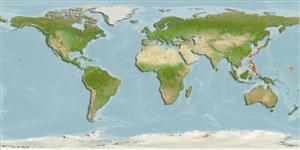分类 / Names
俗名 | 同种异名 | Catalog of Fishes(属, 种) | ITIS | CoL | WoRMS | Cloffa
Environment: milieu / climate zone / depth range / distribution range
生态学
海洋 礁区鱼类; 深度上下限 0 - 15 m (Ref. 90102). 亞熱帶的
Western Pacific: Ryukyu Islands, Japan and the northern Philippines, but not in Taiwan; to the south and east, it is replaced by Diancistrus atollorum.
西北太平洋: 琉球群島。
大小 / 重量 / 年龄
Maturity: Lm ? range ? - ? cm
Max length : 7.0 cm SL 雄鱼/尚未辨别雌雄; (Ref. 559)
背棘 (总数) : 0; 背的软条 (总数) : 70 - 76; 臀棘: 0; 臀鳍软条: 55 - 61; 脊椎骨: 39 - 41. Diagnosis: This species is characterized by the following: vertebrae 11+28-30=39-41, dorsal fin rays 70-76, anal fin rays 55-61; eyes very small (<2.0% SL); outer pseudoclasper ear-lobe shaped, the half-moon shaped ear-lobe extension inwardly directed; inner pseudoclasper firmly joined to outer pseudoclasper anteriorly, with supporter, reduced small hook-like, often with a fleshy flap at its base; 5-7 rows of small scales on the upper cheek, no scales on operculum; head profile is slender; otolith length to height ratio <2.0 (Ref. 57884).
头部鳞片位于颊之上, 鳃盖没有出现。 尾鳍发展良好的, 分离背部的与臀鳍。
Rare species (Ref. 34024). Solitary inhabitant of coral reef crevices to at least 15m depth, cryptic (Ref 90102).
稀有的种.(参考文献 34024)
Life cycle and mating behavior
成熟度 | 繁殖 | 产卵场 | 卵 | 孕卵数 | 仔鱼
西北太平洋: 琉球群島。
Nielsen, J.G., D.M. Cohen, D.F. Markle and C.R. Robins, 1999. Ophidiiform fishes of the world (Order Ophidiiformes). An annotated and illustrated catalogue of pearlfishes, cusk-eels, brotulas and other ophidiiform fishes known to date. FAO Fish. Synop. 125(18):178p. Rome: FAO. (Ref. 34024)
世界自然保护联盟红皮书 (Ref. 130435: Version 2024-1)
人类利用
渔业: 没有兴趣
工具
特别资料
下载 XML
网络资源
Estimates based on models
Preferred temperature (Ref.
123201): 24.1 - 29.2, mean 28.7 °C (based on 588 cells).
Phylogenetic diversity index (Ref.
82804): PD
50 = 0.5000 [Uniqueness, from 0.5 = low to 2.0 = high].
Bayesian length-weight: a=0.00389 (0.00180 - 0.00842), b=3.12 (2.94 - 3.30), in cm total length, based on all LWR estimates for this body shape (Ref.
93245).
营养阶层 (Ref.
69278): 3.3 ±0.5 se; based on size and trophs of closest relatives
回复力 (Ref.
120179): 低的, 最小族群倍增时间4.5 - 14 年 (Assuming Fec < 100).
Fishing Vulnerability (Ref.
59153): Low vulnerability (10 of 100).
